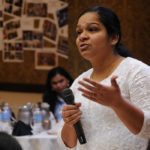Republished with permission by Vista, see original article here
Photo by Helena Lopes on Unsplash
Who are the dominant voices speaking for Europe within the churches or mission networks with which you are most familiar?
Not surprisingly, our respondents’ answers depended very much on their own context. Some interpreted “dominant” to mean – as we intended – rather too outspoken, powerful or vocal; whilst other respondents interpreted “dominant” to mean simply the leading voices or authorities.
So, in terms of dominant voices “speaking for Europe,” it is not surprising that respondents mentioned the Evangelical European Alliance (EEA) and the European Evangelical Mission Association (EEMA), as well as the Pentecostal European Fellowship and the Conference of European Churches as well as national evangelical alliances. Other movements mentioned included Hillsongs, Alpha, 3DM and networks of Baptist leaders. A large number of individual leading ‘voices’ were mentioned, too many to mention here but including Pete Greig, Jeff Fountain, Matthew Skirton, Karl Martin, Rich Robinson, Miriam Swafield, Sara Breuel and the Anglican Bishop in Europe, Robert Innes, alongside Vista’s own Jim Memory.
Significantly, representatives of migrant churches and movements offered a different perspective, and were more likely to identify dominant or dominating voices: Peruvian missiologist and London-based pastor Samuel Cueva noted that “dominant voices are still the western church” and that any movement towards polycentrism and reciprocity in European mission is “a very slow process.” Similarly, Usha Reifsnider of OCMS and the Centre for Missionaries from the Majority World notes Western dominance and, specifically, that greater “financial resources give the American Evangelical voice the most prominence” within Europe. A third perspective from within migrant or diaspora communities comes from Dr Harvey Kwiyani, who says that dominant voices are “mainly white Europeans” who, damningly, “more often than not, seem to have no real understanding of what current mission in Europe needs to do.”
A note of optimism, however, comes from Jeff Carter, who as a North American Baptist provides an outsider’s perspective on European mission. Jeff observes that “churches in the former Soviet-occupied territories have started to raise their voices and are being more respected in conversations” about evangelism and mission. So whilst it may be fair to say, as Raphael Anzenberger does, that dominant voices typically come from “English-speaking nations and Scandinavia,” the positive news is that other perspectives and other voices may increasingly be being heard.
Whose voices are marginalised and ignored in discussions about the health of the Church and mission in Europe?
This second question follows naturally from the first: since some voices dominate, we asked specifically about which voices are marginalised and/or ignored. Of course, we must acknowledge the paradox of asking about who we are unaware of – by definition it is difficult (if not impossible) to identify who’s in our blind spots! But some groups of people were identified as being marginalised, including women, migrants, young people and specific denominations or churches.
As the list of participants in this research itself demonstrates, female voices are outnumbered by male ones. As Tony Peck, General Secretary of the European Baptist Federation notes, “in some parts of Europe, women’s voices are marginalised and ignored, and their leadership gifts are suppressed.” Leaders of mission agencies shared this view: women’s voices are effectively marginalised because most church and mission leaders are male, points out Kent Anderson, British Director of ECM. And Greater Europe Mission’s John Gilberts mentioned several examples of young female leaders having an incredible impact in their communities but whose voices are not being heard in any discussions about mission in Europe.
The most common response to this question, however, was that migrants – those from outside of Europe – were being systematically ignored and marginalised. This was mentioned by all types of respondent, with the most enlightening responses coming, not surprisingly, from representatives of migrant and diaspora churches. Samuel Cueva suggests that diaspora mission leaders are not being heard – but one of the reasons for that is a lack of “involvement in critical reflection by [for example] Latin American leaders working in Europe.” Harvey Kwiyani argued that conversations are happening around diaspora missiology but that, regrettably, these are “taking place among diaspora people but draw little interest from local mission leaders.” Some of the most insightful comments came from Usha Reifsnider, who noted that majority world voices have more influence today than ever before – but still operate within a western paradigm and “continue to view their identity through the lens created by the West and reinforced through colonialism, postcolonialism and neocolonialism.” Usha concludes that non-Western voices not dependent on “the approval, resources and influence of Western theology” are ignored both by the West and the majority world.
Others thought to be marginalised within European mission include Pentecostals, Orthodox and Catholics, especially the youth movements and those involved in the revitalization of the Catholic Church, according to John Gilberts and others. Similarly, Cueva indicates that missionaries from independent churches and non-conventional missionaries, who may not be connected to a sending agency, are excluded from conversations about European mission. The final type of marginalisation mentioned was that based on ethnicity or another identity, including people from Eastern or South-Eastern Europe, and Roma.
Which of these marginalised voices do you think most urgently deserve to be heard?
Of course, all marginalised groups and voices deserve to be included and listened to. However, it may be that some voices need to be heard more urgently.
Amongst our respondents, there was widespread recognition of the fact that Christian migrants with a ministry in Europe deserve to be heard urgently. This is the argument of Frank Hinkelmann, writing on behalf of the EEA, who notes a collective failure to “invite and to include the migrant church to our national and European floor.” Jeff Carter concurs that “there needs to be a concerted effort to allow new migrant churches to the table for conversations” around evangelism and mission. Encouragingly, he reports “bright pinpoints of light in some countries that have deliberately invited them to the table and work side by side for the sake of the Gospel.”
Other respondents also added specific examples from within ethnic minorities and migrant churches. Mike Betts of NewFrontiers suggests we need to heed “those who have converted from Islamic nations… as we face increased multiculturalism in most European nations.” And Raphael Anzenberger argues we should be listening to voices from countries where there are significant evangelistic and missionary breakthroughs, such as Spain, France, Czechia and North Macedonia. Those working there evidently have much experience worth sharing.
Amongst the migrant church respondents, Samuel Cueva advocated for urgently listening to independent church leaders, specifically those who have emerged from non-conventional missions activity or diaspora mission; many of these will be Pentecostals or Charismatics. Usha Reifsnider stressed the importance of listening to those leading African, Latino and Asian mission initiatives in Europe that are pioneering outreach beyond their own ethnicities.
Other respondents argued that we should be most urgently listening to those leading youth movements across Europe; those working amongst disaffected Catholics; female leaders and missionaries; and, with great biblical precedent, listening to the voices of “widows and orphans,” and those working with and alongside them.
The Vista Editorial Team is comprised of Darrell Jackson, Jim Memory, Jo Appleton, Chris Ducker, and Evert Van de Poll





